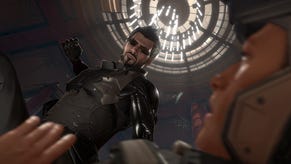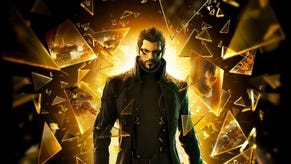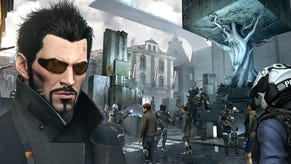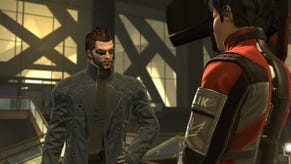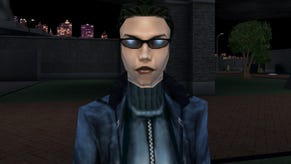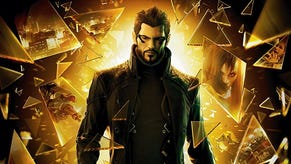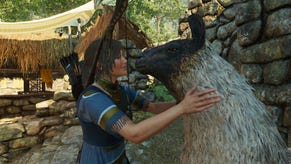Deus Ex: Mankind Divided: An Interview About Jensen 2.0
Tools and weapons
"Deus Ex meets District 9" is how the company described Deus Ex: Mankind Divided [official site] during a demo I attended at E3. Set two years after Human Revolution, Mankind Divided showcases a society still deeply fearful after the Aug Incident where mechanically augmented people turned violent, stripped of self-control after a signal deliberately interfered with their in-built bio-chips. The scale of the incident means augmentations are now viewed with suspicion and augmented people treated as outcasts. Adam Jensen himself is working as a counter-terrorist agent fighting some of the resultant crime. Well. That's his day job. He secretly believes the task force was set up by the Illuminti for a different purpose and is working to take them down.
"He's a tool and a weapon," is executive game director Jean-François Dugas' analysis of this Adam Jensen.
"In the first game he was more a blue collar kind of guy who got caught in something way bigger than him. Like the famous meme 'I never asked for this'. But it's true. The guy was not necessarily going to get augmented, to jump on the band wagon, even though his former employer David Sarif wanted him to do so.
"A big important choice was removed from him. It's not that he hates [being augmented] but he didn't choose it. He had to go through a journey to take back what he lost and take responsibility and do something about it. This time around we go for an Adam Jensen that's fully embracing what he is today. He has a lot of possibilities. He's a tool and a weapon so what does he choose to do? You know you are a weapon so how are you going to use that."
According to Dugas the shift towards ownership of his augmentations should be reflected in increased fluidity of gameplay using Jensen's new abilities. None of what I saw during my trip was hands-on so I couldn't get a sense of that but it's an interesting idea and one which was picked up by gameplay director Patrick Fortier.
"He's the Jensen 2.0 and we have all these cool augmentations," says Fortier. "How do we make that a little more visceral? A little bit more reactive so you can use a lot of these things really fluidly into combat? There's a lot of work put into that. Even the low-level stuff like how we frame the weapon and what's the recoil and the muzzle flash and all those little things that make it feel right. But also moving through the environment, cover to cover, or doing takedowns from cover - all these things so you never have to start fighting with the controller to do what you want to do and to push a little further from Human Revolution."
The demo showed off a Tesla gun arm, a dash ability, a nano blade (which is essentially a sword thing which fires from your wrist like you're a stabby Spider-man) a Titan Shield which lets Jensen withstand heavy fire for brief periods of time by way of a cool polygon effect. I ask which augments Dugas and Fortier were most pleased with and why.
"I like the gun arms a lot but I have to be consistent so I'm going to talk about the Icarus Dash," says Fortier. "It's a really interesting one because it's very versatile. Augmentations for me are basically tools of expression for players. That's how we think about them. How can you use them in creative ways and combine them in different settings and for stealth or combat? The Icarus Dash is a good example of that because you can use it to smash people and clear the way but you can dash straight into cover as well and combine it with the cloaking system and suddenly you have a really powerful tool to go across the environment stealthily or you can use it for exploration and reach hard-to-reach places and be really thorough."
Dugas, however, is all about those gun arms. "Whether you're stealthy or combat-oriented you can easily use them on the fly. Those gun arms are not just lethal, they're also non-lethal so we're bringing more flexibility into the overall experience. You might want to play combat but it doesn't mean you want to kill. In the last game you were kind of forced - if you were stealthy you have options to go non-lethally but if you were the combat kind of guy you couldn't do that so it has more flexibility with that. You can go full combat and still save human lives or you can decide to kill as well or use them in sleath fashion."
He adds that "the fact that they're just like a one-two punch kind of thing is really really cool."
I remember Graham sharing links to just a small fraction of the material the Deus Ex team had been inspired by as they created their game world so I asked about the tech research for Mankind Divided.
"A lot of what you're talking about - that research - was done on Human Revolution because we looked at a lot of material all over the place and a lot we didn't use in Human Revolution. The world of Mankind Divided is only 2 years after Human Revolution and in that sense we wanted to keep a continuity so there wouldn't be a huge gap in terms of what's new and totally crazy that wasn't there two years before. It's continuity and evolution of the things that were existing in Human Revolution. If eventually we do have another game in the series about 6 or 10 years in the future we would try to make that gap bigger to show that time has passed."
This is where the developer's approach to world-building comes in.
When an idea comes up there's a process to go through, questioning how that technology would fit in the world. "How do we justify it?" asks Fortier. "Where are those parts coming from? How's he recharging it? It needs to make sense in the world. There's no infinite magical thing. It needs to be rooted in reality."
I ask whether that's how Eidos Montreal keep an eye on feature creep. Is it the constant run of questions which stops Jensen becoming some fantastically over-complicated Swiss Army Knife of a man?
"The key is that sometimes you need to come from the fun side - "it would be cool if..." - and then we'll go into researching in the real world if this would be credible. If it's credible what would be the recipe to make that for Adam. Of course we're taking some liberties - we're a world of fiction – but we are always trying [keep in mind] what's possible in the real world, whether that's today or things we know [will happen] tomorrow."
An element being included in several games I've seen at E3 or that I play already is a level editor. Watching the demo person zoom round the game environments, figuring out ways to reach objectives I wonder if giving players that toolset is something under consideration for Deus Ex.
"It's something that can be really really interesting depending on the kind of game you're making," says Dugas. "This time around we changed the engine. We're now with the Dawn engine and we had to really rework everything. We wanted to focus on the first reason why you play a Deus Ex game and it's for the journey. [Not only the] story but the choice and the consequences. We really, really focused on that. I'm not saying it wouldn't happen in the future – it's something I would love to see – but we would have to think how we would make it happen and fit the Deus Ex universe."
Fortier adds, "I think it's the same mindset we have for multiplayer and things like that. It's not that it's not possible within the context of the franchise but if we're going to tackle something important like that it has to be the main focus of the whole thing and we need the right idea, the right structure."
Skipping back to the subject of transhumanism which is so central to Deus Ex and to Adam Jensen, I ask about the developer's mindset when it comes to approaching those subjects in-game, particularly with the extreme societal tensions and segregation brought about by the Aug Incident.
For Dugas it's about presenting the conflict but staying neutral as developers. "It's a message about who we are and our angle with that is that we don't want to be preachy and say this is right, this is wrong," he says.
Later he adds, "We love to explore those [issues] - whether the promise of augmentations or the segregation and let the player make up their own mind about these subjects, let them explore one angle of the conflict, then the other angle and have them think about those things and come up with their own stuff. I think this is what is important to us - to stay neutral and make sure people have a great experience and if they want to go deeper than that that they have meat to chew on."
For Fortier this goes back to the world-building. "It's not gameplay mechanics over a backdrop, it's world-building. If you think in terms of world-building you have to justify everything. There's a new technology. How would it be used? Who would be trying to control it? What would this company be trying to do? We have these discussions all the time when we're adding elements and tools. Who's using it? Well, that's a commercial use and that company isn't doing that so they wouldn't do it that way so it's not going to look like that and they'd have a portable version which would look different... All those discussions happen all the time. I think that's ultimately what comes across in the game, it's not just an excuse to shoot or hide, it's a real world that deals with real topics and you can see the offshoot of all the shades of grey and all the consequences of that throughout the whole world."
We've been speaking vaguely about transhumanism as if it's this universally understood concept but the reality is that it means different things to different people. Same with augmentations – I've been to a few art exhibitions and talks on the subject and the point at which enhancements or technological developments interfere with whether you are considered "pure" varies wildly depending on who you talk to. I ask whether Eidos Montreal has to come to an internal consensus on the point at which someone would be a non-natural human.
The answer I get is more about how in Mankind Divided the society prefers a binary approach – augmented or not.
Trying to inch closer to the studio (or the game's) cut off point for being a natural human I was going to work through a number of potential augmentations to see what would put you in the augmented camp. I started with something I'd consider super low-key and low-risk assuming we might work along a gradient to find the tipping point. "If somebody had had laser eye surgery would that put them in the augmented camp?"
It turns out to be a short trip to that tipping point.
"They would be in the camp for augmented people because obviously they have something - even though it's technically inoffensive," explains Dugas. "The fear is not rational. When you fear something you're not in the rational world anymore. You're building this construct around you and you put everything into the same socket whether it belongs there or not. It's one of the problems with seeing things in absolutes."
"The impression is probably worse for people that have very visibly easy-to-identify augmentations. Anything that looks different," adds Fortier. "What ultimately happened at the end of Human Revolution is there was the Aug Incident and everyone who was augmented was hacked into and went nuts. They killed people and killed themselves. They lost control of themselves and everybody in the world was a witness to that event or suffered in their own family or friends or were hurt in a close way. That's where all the fear came from and the truth never really fully came out.
"Rumours, people trying to manipulate the truth, people hiding the truth, people choosing not to hear the truth - like in real life. That's what led to this climate and then it obviously served the purpose of some people to dig that wedge between them and the people. But it's very tangible what happened. It's not just hearsay. They saw it and with the irrational fear it doesn't matter how you were augmented, you were a victim of the Aug Incident.There was that backdoor that was exploited and you went nuts like everyone else."
We have time for one more question so to round off I ask about Adam specifically. Dugas referred to him as a tool and a weapon so my question is about how Jensen sees himself at this point – is this a man with a balanced view or has he stopped seeing himself as human at all.
"From my point of view I think it just came - how do you say that - he came into an age?" says Dugas. "He came to maturity in the sense that he knows he has these powers and abilities, his body has obviously changed, and I think he came to peace with that. Now he decides to use it for the greater good but also for his personal quests like the score he couldn't settle in the first place. He's that kind of character. If you were talking with Mary Demarle - she's one of the key [people] behind the creation of Adam Jensen - she might have a different spin on it but from my own perspective that's how I see that character. I think that character is going to rest when he finds what he is looking for."







